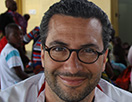This session will provide an overview of progress in malaria elimination over the past decade, and the ongoing transition from a one-size-fits-all to a tailored approach.
Learning Objectives:
- To understand the transition in global malaria epidemiology over the past decade, including successes, failures, and key lessons.
- To appreciate the opportunities and challenges for malaria elimination in the next decade, and the implications for ultimate malaria eradication.
- To understand how countries evaluate the case for eradication; the processes for translating what can be achieved into long term targets for what should be achieved; and evaluating the case for global malaria.
Malaria eradication presents daunting challenges to every aspect of the scientific community, from basic research to implementation science. Over the past year, the Malaria Eradication Scientific Alliance (MESA) has conducted, with leadership and direct participation of about 150 members of the research community, a review and analysis of malaria research priorities. These are informed by critical problems faced in the field, as well as emerging data and new technologies that can lead to solutions. The Malaria Eradication Research Agenda (malERA) refresh has identified both areas of promise and neglect for further consideration.
Learning Objectives:
- To understand that R&D is critical across the continuum from control through the elimination end.
- To understand the areas of progress against the original malERA.
- To discuss priority questions that have been identified as important for future progress, and areas of neglect.
This session will build upon the online pre-course lecture titled “The Biology of Malaria.” Participants will engage in an active discussion of the biological implications of malaria eradication, including critical biological features of the parasite and current knowledge gaps. Key discussion topics include parasite biology, including cell biology, parasite genetics, biochemistry of the parasite, red cell interaction, drug action and resistance mechanisms, malaria epidemiology, and parasite-vector relationships. Participants are expected to be familiar with the life cycle and general biology of malaria parasites. Those who do not have a background in biology or medical parasitology, or who require a primer should review the suggested reading materials and referenced website in addition to the online pre-course lecture.
Learning Objectives:
- To understand the biology and life cycle-basis for this disease, including global public health aspects of malaria.
- To understand the incidence and distribution of infection and disease within human populations, determinants of frequency and distribution, methods of measurement, and magnitude and consequence of disease on the population.
- To consider the interrelationship of organisms and their environments, including identifying ways of reducing the incidence and/or severity of disease within populations, obstacles, and consequences.
This session will provide an overview of the different aspects of mosquito biology that are key to parasite development and malaria transmission. The session will also cover current vector control strategies and future methods that can aid disease control.
Learning Objectives:
- To understand the complexity of malaria transmission by the mosquito vector.
- To discuss present challenges facing vector control.
- To identify novel opportunities to block malaria transmission by the mosquito.
The session will present expected impact of elimination activities on biology of human hosts of varying ages exposed to different levels of past and present malaria endemicity and transmission intensity, including waning of naturally acquired immunity, alteration of tolerance and susceptibility patterns and disease presentations, and implications for surveillance for malaria resurgences/reintroductions. The session will also focus on what kind of immune responses (breadth and duration) are needed for an effective vaccine strategy as part of elimination efforts, what target immune response (T and B cells), and the difficulty of eliciting these in spite of adjuvants.
Learning Objectives:
- To understand controversies around duration of naturally-acquired immunity and tolerance (anti-disease and anti-parasite), and implications for elimination (e.g. when does a population become susceptible because they lose immunity).
- To discuss what is known about immunity to malaria in the design of malaria elimination.
- To understand how host factors influence safety and efficacy of antimalarial drugs.

This lecture and discussion will focus on understanding the potential role and principles of applied modeling for public health action.
Learning Objectives:
- To understand the feasibility of engaging in malaria elimination.
- To discuss elimination strategies with integrated, mixed interventions.
- To model analysis and consensus for intervention and elimination.
This session will present an examination of a step wise approach to progressing from malaria control toward elimination, with case examples from Ethiopia, Senegal, and Zambia. The hypothesis that a sequence of key steps can accelerate malaria elimination efforts, even in high transmission areas, is supported by emerging evidence on feasibility and impact.
Learning Objectives:
- To describe the A-E steps for elimination.
- To appraise the stratification of malaria and the set of interventions needed to address various transmission settings.
- To analyze the relative importance of malaria prevalence, incidence, and case history data across the continuum of transmission.
Malaria elimination programs are ongoing under a variety of different epidemiological, cultural, and political environments, with the result that the programs, while having shared goals, will approach some implementation issues differently, and adapt to solve the problems each encounters. In the context of global technical guidance, each country must design a technical strategy and operational plan which will be influenced by local data, secure political will and sufficient funding, and align different stakeholders.
This session will present the strategies, learning, and progress of two active elimination efforts being carried out in China and Southern Mozambique, from their initial conceptualization to the current status in the field.
The malaria elimination program in China is quite advanced, and last formally reported 56 indigenous cases (2921 total) in 2014. The program has been implemented in the context of subnational distribution of disease, epidemiology of both P. falciparum and P. vivax, and four major anopheline species.
Mozambique is formally categorized as implementing “control,” with high parasite prevalence, an estimated 7-9 million cases and 9-12 thousand deaths, focused on falciparum and three anopheline species. As elimination program in being piloted in one district in Southern Mozambique.
The discussion will engage participants in the key challenges and learnings that are emerging from each program, encouraging the comparison among two quite different country scenarios.
Learning Objectives:
- To analyze how each program has approached and adapted its strategy and technical approach and implemented to the local environment.
- To identify the major challenges that will confront programs as they focus and advance towards elimination.
- To discuss the lessons learned and identify key concepts that could be generalizable to other country scenarios.
Vaccines that Interrupt Malaria (Parasite) Transmission (VIMTs) are widely regarded as a necessary tool to accelerate elimination efforts. The session will review the community goals for malaria vaccine development, as outlined in the WHO- sponsored Malaria Vaccine Technology Roadmap. In addition, the biological, technical, and regulatory challenges and opportunities in developing VIMTs will be reviewed. Finally, an update on the current status of the global malaria vaccine portfolio will be provided.
Learning Objectives:
- To analyze the role of vaccines in accelerating malaria elimination and eventual eradication.
- To identify the biological, technical, and regulatory challenges and opportunities in developing Vaccines that Interrupt Malaria (Parasite) Transmission (VIMTs).
- To review the current status of the global malaria vaccine portfolio.
This session will discuss the need for new tools for vector control in relation to: insecticide resistance, outdoor biting, residual transmission, and synergy with mass drug administration.
Learning Objectives:
- To identify the need for new tools in Vector control.
- To determine what products are relevant to particular ecologies.
- To understand what is in the pipeline and when it will be available.
During this session, new available experimental and modeling data about required parasite detection levels to accelerate malaria elimination will be presented.
Participants will have the opportunity to analyze the usefulness of current and new diagnostic technologies for elimination at different endemic settings, according to levels of transmission and available resources. Research and development gaps as well as new promising technologies will be discussed.
Learning Objectives:
- To analyze the usefulness and role of current and improved diagnostic tools in strategies to accelerate malaria elimination.
- To discuss research and development gaps for improved malaria diagnostics from control to elimination.
As countries plan for malaria elimination, social factors can impose major barriers for the uptake of important control strategies (e.g., bednet use) and for the sustainability of achieved gains. Similarly, environmental factors (natural environment – e.g., climate, land cover; human-made environment – e.g., housing conditions, land use), which historically were the target of control interventions, may play a particularly important role for the achievement of elimination. This session will discuss how these factors may affect elimination goals, and how countries should anticipate and plan ahead in order to mitigate the challenges that social and environmental factors impose.
Learning Objectives:
- To identify important social and environmental factors that affect the pattern and the level of local malaria transmission, and then may impose barriers for malaria elimination.
- To discuss the feasibility of social and environmental interventions as strategies for current efforts of malaria elimination.
The session will present an overview of past and current efforts to eliminate malaria through the use of drug-based strategies. Emphasis will be placed on the differences between the “control mode” vs. the “elimination mode.” Participants will be encouraged to discuss the adequacy of different drug regimens (combinations of drugs) used for elimination, as opposed to control purposes.
Learning Objectives:
- To differentiate between the use of antimalarial drugs to control malaria and to eliminate malaria.
- To review the different characteristics of antimalarial drugs and identify what would make a drug (or a combination of drugs) ideal for elimination purposes.
- To discuss the role of drugs in past control/elimination efforts, and which lessons could be learnt from these.
Case Study 1: Vector Control
With the massive scale up of both malaria treatment and prevention, a pipeline of innovation to provide tools to sustain the program (such as in the face of resistance) will be critical.
This teaching case study focuses on innovative approaches to addressing the challenges of introducing and scaling up a new prevention tool that overcomes insecticide resistance. New sources of funding for innovation post product development and licensure may be required to sustain the R&D pipeline as well as ensure maximum impact.
Learning Objectives:
- To identify what are the benefits and challenges of adopting a replacement tool into the malaria toolbox.
- To analyze how slow uptake of an innovation affect its price, supply, and the credibility of the competitive product pipeline.
- To discuss what new strategies can be implemented to overcome the scale-up challenges of a valued intervention.
Case Study 2: Radical Cure
The eradication of Plasmodium vivax malaria presents unique challenges, given the ability of this parasite to lay dormant in the human liver during the hypnozoite stage of its life cycle. New tools that can provide radical cure of this liver-stage infection are critical. This case study will examine the opportunities and challenges surrounding tafenoquine, an 8-aminoquinoline treatment currently in Phase 3 trials. This drug may offer a single-dose alternative to the current recommended treatment for radical cure of vivax, primaquine, which requires 7 or 14 days of administration.
Learning Objectives:
- To understand the normative and evidence requirements to support the introduction of novel therapeutic agents for the treatment of vivax.
- To discuss the nuances of “one-size-doesn’t-fit-all” in the development of new medicines for malaria; in this specific case of 8-aminoquinolines, understand WHO guidance around the need to screen patients for G6PD enzymatic deficiency before administering treatment.
Countries will each make their own decision whether to control or eliminate malaria. We will weigh the available evidence for whether or not malaria elimination and eradication are achievable in the context of constrained health and financial resources, and contrast this analysis with the formal investment cases for eradication of specific neglected infectious diseases.
Learning Objectives:
- To discuss the analytic framework for why low and high malaria burden countries might consider investing substantial resources to eliminate malaria.
- To review the methodology and available economic evidence for and against investing in national elimination and global malaria eradication.
This session will provide an overview of the new medicines, which will be available by 2025 for use in an eradication agenda, the key questions which need to be addressed in clinical development, and the remaining unmet medical needs.
Learning Objectives:
- To appraise how drug discovery has changed in the last decade with the increased success of phenotypic based screens.
- To distinguish what can and cannot be done with new medicines and the importance of having targets.
- To understand the importance of both clinical safety and efficacy when developing new medicines.
This session will feature presentation and discussion of entomological, parasitological, and serological approaches to quantify transmission and changes in transmission.
Participants will discuss how to interpret outcomes and understand the logistical, financial, and technical requirements for different approaches.
Learning Objectives:
- To appraise entomological, parasitological, and serological malaria transmission estimates at different levels of transmission intensity.
- To appreciate the temporal and spatial dynamics in entomological, parasitological, and serological transmission estimates.

This session will feature presentation of newer molecular and serological approaches to both measure and monitor changes in malaria transmission. These will be discussed in the context of what will be useful for biological understanding transmission and what are scalable tools that can answer program questions. The session will also discuss the need to develop and refine existing surveillance methods to optimize the data collected.
Secondly, participants will be given a set of transmission scenarios to discuss in groups what the optimal measures would be to measure and monitor transmission and how best to interpret outcomes.
Learning Objectives:
- To understand technological developments in molecular and serological approaches for malaria transmission.
- To discuss applications of these new approaches.
- To appreciate the need to improve surveillance approaches for accurate monitoring of transmission.
This session will discuss the fundamentals of health systems and health systems innovations: what is being learned. It will also focus on health systems strengthening challenges for malaria elimination: from leadership and governance to financing and delivery.
Learning Objectives:
- To understand the fundamental concepts in health systems thinking.
- To review what is being learned from ongoing innovations in health systems strengthening.
- To discuss some of the key challenges for health systems strengthening for malaria.
This session will include a presentation and moderated discussion on the application of health systems thinking in malaria programs. We will also cover how malaria specific interventions can be tailored to given health and social systems and in general also contribute to health systems strengthening.
Learning Objectives:
- To understand the principles of integrated approaches to malaria control and elimination interventions in different endemic settings with different health and social systems.
- To develop and understand the key principles and practical approaches for integrated elimination efforts under health systems constraints.
The session will focus on the use of mapping and risk stratification for targeting aggressive elimination strategies, such as mass drug administration (MDA), in settings with very low and heterogeneous transmission.
Learning Objectives:
- To describe the role and basic process for spatial risk mapping for malaria elimination.
- To describe the role of transmission risk stratification for targeting aggressive elimination strategies such as MDA.
This session will feature an introduction of the concept of surveillance-response and how surveillance-response approaches/systems can and should be tailored to different transmission/elimination settings.
Learning Objectives:
- To understand the concept of surveillance as intervention and how this leads to tailored surveillance response-approaches/systems in different transmission/elimination settings.
- To distinguish the surveillance-response approaches that are based on the minimal essential data collected in space and time to the traditional concept of monitoring and elimination.
As non-African countries move towards elimination, P. vivax becomes the predominant source of malaria infections and disease. We will explore the biological characteristics that make P. vivax more resilient to control, how they affect the effectiveness of current control methods, and outline what tools (existing and novel) may be required to accelerate the elimination of P. vivax.
Learning Objectives:
- To understand the central role of relapsing infection in the epidemiology of vivax and to highlight the importance of targeting these ‘hidden’ stages in elimination programs.
- To explore the role of asymptomatic infections and high transmissibility.
The session will explore the role of behavioral and social sciences to support adherence to and community engagement in malaria elimination interventions. The session will be interactive and unpack the concepts of adherence and engagement and then build approaches to explore and utilize these in elimination activities.
Learning Objectives:
- To develop a framework of facilitators and barriers to individual adherence to malaria elimination activities.
- To discuss the role of community in achieving and sustaining malaria elimination.
- To describe the application of social science tools to support successful and effective individual and community involvement in malaria elimination activities.

With regards to insecticide resistant and residual malaria mosquitoes, this session will cover entomological surveillance to detect resistance and identify residual vectors, and new approaches to target resistant and residual vectors. In addition, the session will focus on antimalarial resistance: drug selection and fitness cost – the case of chloroquine; molecular markers of antimalarial resistance; and surveillance of resistance in elimination contexts.
Learning Objectives:
- To discuss the importance of resistant and residual vectors, and how to target them.
- To appraise the drivers of antimalarial drug selection and its impact on elimination activities.
Prior to 2000, the global malaria product development pipeline had been sparse, reflecting barriers throughout the development and business cycle. Today, the products recommended for vector control, treatment, and vaccines reflect a range of innovation, partnerships, and corporate investments that point to a transformation in the way industry engages in malaria R&D. This session will draw upon leaders from industry who have participated in malaria product development in a variety of partnerships and have led efforts in vaccines, drugs, and vector tools which are resulting in real products in the market.
One lesson from the Science of Eradication: Malaria leadership development course is the need for ongoing innovation and product development in malaria. This panel will explore the incentives and challenges for industry to commit to malaria as a critical partner of the eradication agenda.
Learning Objectives:
- To illustrate why companies participate in malaria product development, and if there are incentives or disincentives to their engagement.
- To learn about the range of partnerships that can be effective in developing malaria products, and the merits and challenges of these experiences.
- To debate how the unique challenges that arise from the malaria eradication agenda (such as urgency, commitment to volume of manufacturing, drivers for investment, and potential global impact) may influence industry willingness to remain engaged in malaria R&D.

This session will help participants understand the role of advocacy in malaria control and elimination. The session will focus on developing the analytical skills that are essential to successful malaria advocates and will help participants examine and learn how to apply strategies and tools used by public health advocates.
After an introductory presentation, students will be divided into random groups. Each group will receive one of three scenarios (one high-burden country, one low-burden country, one country with drug resistance) and will be asked to develop messages and strategic advocacy approaches. General discussion will follow around key learnings and the final 10 minutes of the session will be used to hear how individual voices can advocate in the respective countries.
Learning Objectives:
- To understand what advocacy is and how each individual, with the right tools, can actively advocate for change.
- To describe how the inclusion of stakeholders such as civil society and media in advocacy efforts can increase the likelihood of successful change.
- To give examples of how collaboration with other sectors can lead to a stronger case for malaria advocacy.
- To compare the three cases and understand how messages can be adapted to the context for successful advocacy outcomes.
This session will provide a presentation of the Global Fund for AIDS, TB and Malaria (GFATM) approach to implementation of the procurement strategy to increase access to medicines – by building upon a 2 year project to transform global sourcing; including the anticipated contributions to supply chain management and partnership building at the Global Fund.
Learning Objectives:
- To illustrate how to grow a modern public sector procurement organization through leveraging a private sector model.
- To analyze how innovations that improve healthcare access are central to optimizing donor funds.
- To discuss implications of the strategy on the ability to bring innovative products into programs financed by the Global Fund.
Participants will analyze the challenges confronting the MACEPA project in Zambia (PATH’s Malaria Control and Elimination Partnership in Africa) in preparing to scale up malaria elimination activities. The discussion will focus on how MACEPA can facilitate the coordination of non-state actors (including international non-governmental organizations, national non-governmental organizations, community- and faith-based organizations, donor agencies, traditional authorities, regional coordinating bodies, and academic institutions) in order to support the government’s elimination targets and strategies.
Learning Objectives:
- To identify the roles and core competencies of non-state actors related to the MACEPA project.
- To assess the motivations and positions of non-state actors.
- To propose strategies for MACEPA to promote effective collaboration among government and non-state actors in working toward malaria elimination.
The scaling up of vector control has been a key factor underlying the progress in malaria control in Africa, with both speed and scale as critical factors in impact. This session will cover key operational considerations in taking LLINs to scale, including options that should be considered and the residual gaps in protection.
The case of the real-world challenges of upscaling LLINs in Tanzania, one of the largest in the world, will highlight the key issues. “Ordinary” challenges include taking the right strategic decisions, coordinating a large number of partners, and financing sustainably this large-scale national program. “Extra-ordinary” challenges include ensuring political support, dealing with system inefficiencies, and corruption. Not surprisingly, running a successful national program requires addressing all of these issues successfully.
Learning Objectives:
- To analyze key strategic and technical elements that are essential for successfully implementing a national-scale LLIN program.
- To appraise the nature and importance of “extra-ordinary” challenges for operating successfully a national LLIN program.

Project management has become one of the most valued skills in organizations of all types and scopes. This session will introduce participants to the project life cycle and the tools that can prove useful in managing projects in each one of the project life stages, and the use of the Rapid Results approach. We will use a practical case study on malaria in Tanzania, to be discussed in an interactive session/exercise allowing participants to grasp traditional and innovative concepts on project management. We will build on the participants’ previous experience by providing and letting them experiment with frameworks that have proven useful in selecting, designing, implementing, and evaluating projects in the context of malaria elimination.
Learning Objectives:
- To learn how to prioritize projects in your project portfolio and determine which ones to launch.
- To understand how to define the projects in a way that increases the probability of success.
- To increase your ability to understand and influence key stakeholders.
- To determine the success criteria and the performance indicators for a project.
- To understand how the Rapid Results process mobilizes teams to achieve tangible results over a rapid time frame and accelerates organizational learning.
One theme of the Science of Eradication: Malaria leadership development course is that innovation – meaning novel solutions to real and emerging problems, whether at the bench or in the field – is quite likely to be one of the few constants as malaria elimination proceeds, driven by changes in the parasite, epidemiology, and the promises of emerging science and resulting tools and strategies. This panel will examine approaches to conceptualizing important questions for malaria elimination, discuss how and whether this should be sustained, as well as challenging questions as to governance and prioritization.
Learning Objectives:
- To analyze how funders and researchers are approaching the malaria elimination research challenge.
- To discuss the perspectives on how innovation in malaria should address the apparent dichotomy between control and elimination challenges.
- To identify how drivers for prioritization in basic research differ from product development or implementation science, and how various stakeholders may define their own priorities.
Eradication is a potential goal for a small subset of infectious diseases that meet criteria for feasibility and priority. Two have been eradicated, two more are reaching the end of sustained global initiatives, and others have elimination and/or eradication as the stated “endgame.” While each is unique, these initiatives share some key elements, and at the same time, have faced enormous challenges. Malariologists must be aware of the lessons learned from the success of other initiatives, as well as how challenges have been overcome.
Learning Objectives:
- To understand the criteria for an “eradicable disease.”
- To recognize key elements of success for eradicated diseases, and how these are relevant for malaria programs.
- To understand the challenges faced by other eradication programs, how they were overcome, and discuss the potential lessons for the malaria program.
Even though the malaria eradication campaign in the 1950’s did not eradicate malaria globally, national elimination and certification has proceeded and is slated to accelerate over the next decade due to a combination of resources, targeted national programing and overall development. The Science of Eradication: Malaria leadership development course has covered the science underlying the goal of elimination, and this raises the question of eradication as the long term goal. This session will draw upon the discussions during the week, with a panel that has focused on these questions for malaria and other diseases. What are the implications of the eradication goal, what can be learned from other diseases, what are the risks, and what more is needed to come to a decision?
Learning Objectives:
- To understand and utilize the definitions of eradication and elimination with specificity.
- To discuss the implications and risks of the long term goal of eradication vs. elimination.
Malaria elimination is the end state for individual countries, and WHO certification processes are generally focused at the country level (although in specific circumstances sub-national focus has also been considered). Progress and success, however, includes not only managing transmission and population movement across borders, but also the political and technical alignment of groups of countries, which can not only accelerate, but in some circumstances may be required. Several regional initiatives have been created and the rationale and progress in three of these (in Mesoamerica, Asia/Pacific region, and Southern Africa) will be the focus of this panel.
Learning Objectives:
- To understand the drivers for creation, consolidation, and/or identification of three regional malaria elimination initiatives, and emerging information on the key components to accelerate progress.
- To discuss how national goals and plans are synchronized with the regional goals, and evidence of positive impact and/or unexpected consequences.
Global technical and advocacy strategies have generated high level estimates of what it would cost for the world to finance eradication. The question for this panel is not how much this would cost, but what are the potential ways in which it could be financed. All estimates are that the fully loaded costs would be far higher than what is currently committed to malaria, even inclusive of integration into existing and emerging health systems. A major contributor for malaria is each country, but donor funding has also been critical, particularly for purchasing of commodities at national scale.
Learning Objectives:
- To analyze the portfolio of options under consideration for financing malaria control/elimination.
- To discuss how financing malaria will be managed in the context of an increasingly complex and competitive agenda in the next decade.
In the Regional Science of Eradication: Malaria leadership development Course in Mesoamerica, one of the participants spoke up at the end that his key learning was also the first challenge for his country – the need to shift mind set from the status quo, firmly rooted in disease control, to one that looks towards elimination as the end goal. If it were only as “easy as changing a computer chip!” The phrase “changing the chip” has come to represent a deeper philosophical as well as practical reorientation. Having participated in the Science of Eradication: Malaria leadership development course, this session will draw across the experience of the course to have participants discuss their learning and suggest their own perspectives on the need, challenges, and impact of reorientation to elimination.
Learning Objectives:
- To identify key elements of mindset that would reflect reorientation to elimination goals.
- To discuss the key barriers that need to be overcome when this becomes a goal for a country and/or region.
- To understand perspectives that run counter to the elimination goal, and identify what kind of intervention could change those perspectives (local data, regional success models, leadership, etc).






















